Gingivitis is a condition in which the gums are inflamed and is no longer rare but can appear at any age if oral hygiene is not performed properly. This condition can be treated at home with simple ingredients that are available in almost every family. However, to achieve the best results, you need to persevere in doing it for a long time.
1. What is gingivitis?
Gingivitis is a condition in which the gums are inflamed due to the attack of bacteria in tartar. In general, gingivitis can often be easily recognized through changes in the gums as well as the feeling of discomfort and pain that the patient experiences during chewing. Some common manifestations of gingivitis include:
– The gums are swollen, painful to the touch and cause discomfort when chewing.
– The gums change color from light pink to red or dark red.
– The gums become sensitive, vulnerable, and bleed from daily activities such as brushing teeth or using toothpicks.
– Dense plaque appears at the base of the teeth and gums.
– In cases where gingivitis is not treated for a long time, the gums at the base of the teeth will weaken, the function of holding the teeth is no longer guaranteed, causing the teeth to loosen.
– Due to the formation of dense plaque, the patient’s breath will definitely have an unpleasant odor.

3. Causes of gingivitis
The most common main cause of gingivitis is improper oral hygiene leading to the formation of plaque. In fact, this is food plaque that remains in the oral cavity after each meal and is not cleaned, over time it will calcify and accumulate into tartar.
Plaque accumulates at the base of the tooth and irritates the gums, over time it will cause the gums to become damaged, swollen and bleed easily. If oral hygiene habits are not adjusted, gingivitis will gradually become more severe, leading to the formation of pus pockets, which can gradually cause the teeth to loosen and fall out.
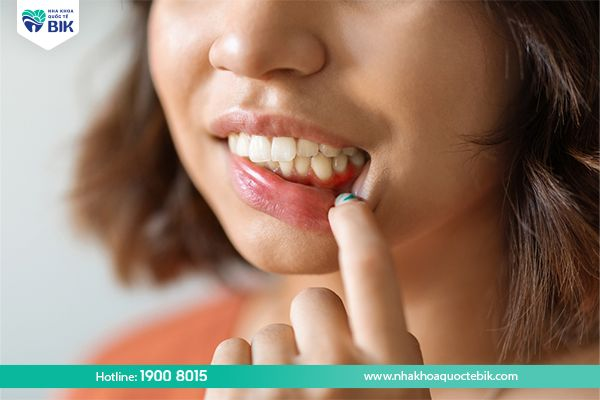
In addition, some other causes of gingivitis can be mentioned as:
– Bacteria, viruses, fungi, some allergic reactions, trauma, or skin mucosa disorders,….
– Regular smoking habits.
– Hormonal changes in the female body during pregnancy or in premenopause.
– Weakened immune system in people with diseases such as diabetes, cancer,…
– Side effects of some antibiotics such as histamine, antidepressants,… reduce saliva secretion, creating conditions for bacteria to attack the gums.
4. How to treat gingivitis at home quickly and effectively
To treat gingivitis quickly and effectively at home, you can apply some of the following methods:
4.1. Using salt water
Salt is not only an indispensable spice in every family’s daily meals, but is also often used to treat oral diseases thanks to its high antiseptic and disinfectant properties. In particular, salt water can be used to treat gingivitis at home to help protect against bacterial attacks, reduce inflammation and restore gums.
In addition, natural fluoride in salt water also has the effect of balancing the natural pH in the oral cavity, preventing loss of tooth enamel minerals, and improving bad breath caused by gingivitis and plaque.
To treat gingivitis, mix about 1 teaspoon of salt with a cup of warm water and use it to rinse your mouth regularly about 2-3 times a day. If you do this consistently, you will see that gingivitis is significantly improved.
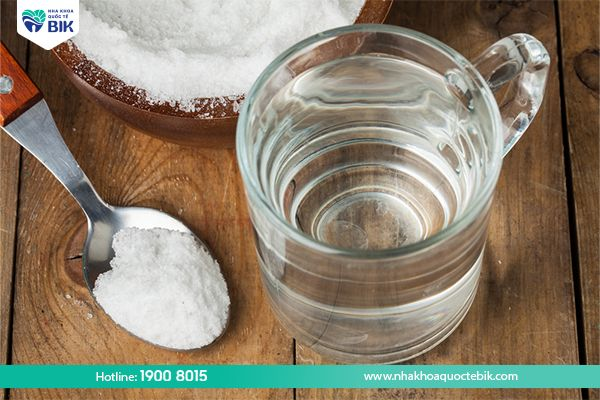
4.2. Using honey
Honey is very useful in daily life, from cooking, treating diseases to beauty. This ingredient is also used to treat gingivitis thanks to its antibacterial, anti-inflammatory and completely benign properties.
Patients can apply two ways to treat gingivitis at home with honey:
– Apply honey directly to the infected area in the morning after brushing your teeth. After about 15-20 minutes, rinse your mouth with clean water. Do this 3 times a day to ensure the best results.
– Brush your teeth thoroughly and then rinse your mouth for about 10 minutes with a mixture of honey, lemon and warm water.
– Note that you should persistently do this until the gingivitis is completely cured.
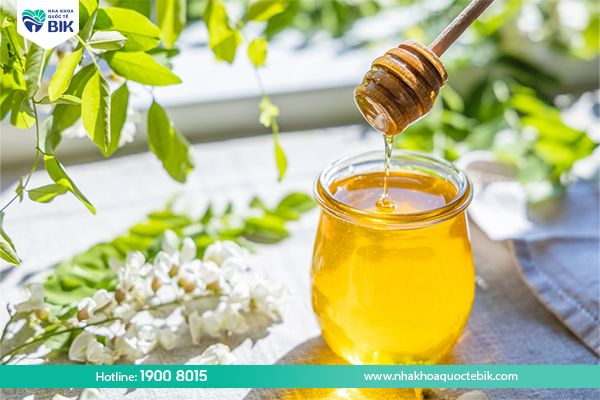
4.3. Using lemongrass essential oil
Lemongrass essential oil has the ability to improve oral health in general, especially gingivitis, quickly and effectively. This ingredient has the effect of removing plaque and treating gingivitis twice as effectively as regular mouthwash.
You can use a solution of lemongrass essential oil diluted with water to rinse your mouth every day, each time for at least 30 seconds to kill all harmful bacteria.
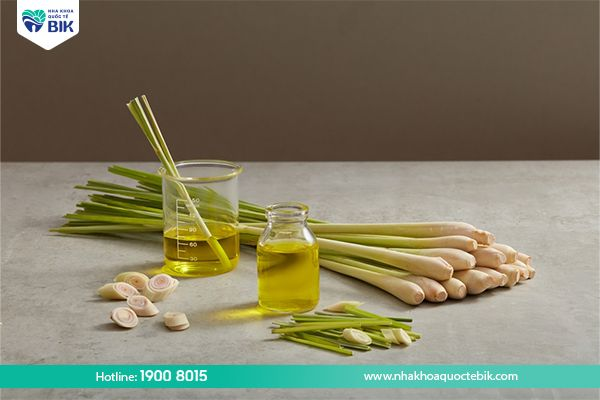
4.4. Using betel leaves
Betel leaves contain 2.4% essential oils, mainly peta-phenol and chavicol and other phenolic compounds that have antibiotic effects and help inhibit bacteria that cause gingivitis as well as other oral diseases. Therefore, you can use betel leaves to effectively treat gingivitis at home with the following methods:
– Method 1: Crush the washed betel leaves, boil them with water and then store them in the refrigerator. Take them out to rinse your mouth gradually at least twice a day, each time for about 5-10 minutes.
– Method 2: Crush the betel leaves, soak them in white wine for 15 minutes and then filter the water. Use this solution to rinse your mouth every day as in method 1.
– Method 3: Apply crushed betel leaves directly to the inflamed gums. Note that you should not rinse your mouth or drink water for 30 minutes so that the essential oil can penetrate the gums to help reduce inflammation.
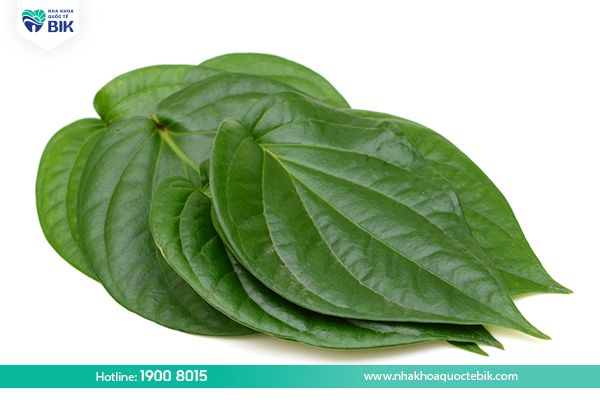
4.5. Use cloves
Cloves are not only effective in cooking but can also effectively treat oral diseases, including gingivitis. This ingredient has very high antibacterial properties, so it can quickly reduce inflammation at home.
To use cloves to treat gingivitis, you can apply the following methods:
– Clove powder: Apply directly to the inflamed area to help reduce pain.
– Dried clove buds: Chew directly for 20 minutes so that the clove essential oil penetrates the inflamed area.
– Clove essential oil: Dilute the essential oil with water to rinse your mouth or mix with olive oil and apply this mixture to the inflamed gums.
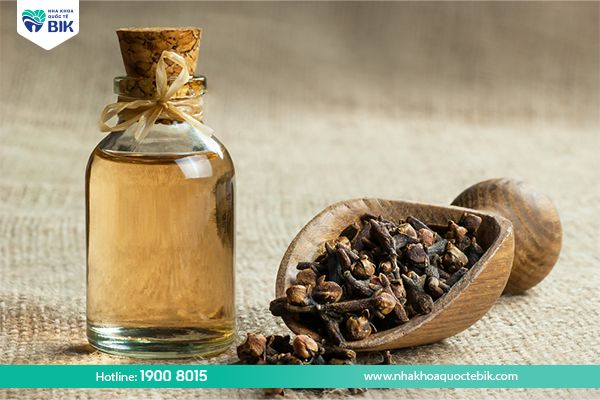
5. Some drugs to treat gingivitis
When you feel that the above measures have been taken for a long time but the infection has not improved but is getting worse, you must go to the dentist for examination and advice on appropriate treatment methods. When the condition becomes serious, the doctor will prescribe antibiotics to treat gingivitis at home, including:
– Antibiotics (beta-lactam, macrolide…): Have the effect of killing bacteria that exist in the gums, often used in the treatment of gingivitis. The combination of spiramycin (macrolide antibiotic) with metronidazole (antibiotic that kills anaerobic bacteria) is effective in treating some oral diseases such as gingivitis, periodontitis, tooth decay…
– Non-steroidal anti-inflammatory drugs (ibuprofen, diclofenac, meloxicam…): Help reduce symptoms of swelling and redness, while eliminating bad breath.
– Corticosteroid group (prednisolone, dexamethasone…): Has strong anti-inflammatory properties, kills bacteria that cause toothache.
– Common pain relievers (paracetamol, aspirin…): Often used to reduce pain symptoms caused by gingivitis. Do not use Aspirin for cases of bleeding disorders or dengue fever.
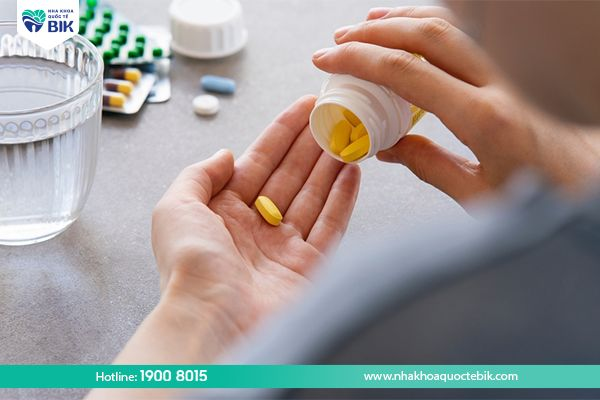
Note that patients should not arbitrarily use any home remedies for gingivitis without a doctor’s prescription. This not only does not bring about effective treatment but also makes the inflammation more serious, directly affecting oral health.
So gingivitis can still be treated at home with simple ingredients available in every family’s kitchen when the disease is detected in the early stages. In case the disease becomes more serious, the patient needs to go to the dentist for examination and advice on more professional gingivitis treatment methods.


















